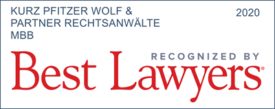What are the standards for assessing whether a certification mark has been infringed? How do these differ from the standards of other types of trademarks? There is virtually no case law on the certification marks in the EU. As far as we know, we have brought about the first higher court decision in the EU for our client. In doing so, the Stuttgart Higher Regional Court confirms a very broad protection of the certification mark and rejects objections such as exhaustion and legitimate use in the event of non-compliance with the trademark statutes.
Certification marks
Since their introduction in Germany and the EU, certification marks, till lead a niche existence. Thus, there is hardly any case law on certification marks in the EU. In this context, quality labels, seals of approval and certificates that can be protected with certification marks are widespread and are particularly appreciated by many consumers looking for sustainable, environmentally friendly or socially responsible products.
However, many owners of quality labels and seals of approval have still not registered certification marks, but regular trademarks or collective marks.
Global Organic Textile Standard (GOTS)
The Global Organic Textile Standard (GOTS) is a globally uniform and applied standard that sets strict requirements for environmental and social conditions throughout the supply chain in textile and apparel production using organically produced raw materials. The Global Organic Textile Standard (GOTS) is a standard with chain of custody certification. This means that for goods certified according to the Global Organic Textile Standard (GOTS), every processing step or other change to products and their packaging may only be carried out by certified companies.
![]() In addition, the Global Organic Textile Standard (GOTS) also includes, for example, regulations on transport, warehousing and the trade of GOTS goods. The Global Organic Textile Standard (GOTS) logo and the GOTS word mark have already been registered as such with the introduction of the Union trademark. The regulations of the Global Organic Textile Standard (GOTS) are referred to in the trademark regulations of the certification marks.
In addition, the Global Organic Textile Standard (GOTS) also includes, for example, regulations on transport, warehousing and the trade of GOTS goods. The Global Organic Textile Standard (GOTS) logo and the GOTS word mark have already been registered as such with the introduction of the Union trademark. The regulations of the Global Organic Textile Standard (GOTS) are referred to in the trademark regulations of the certification marks.
If a certified product is modified or processed without certification, this product loses its certification. Any use for not (anymore) certified (pre)products is not allowed.
For example, the certification mark also guarantees compliance with social standards, such as the payment of minimum wages, or environmental standards such as freedom from certain chemicals, such as those found in printing inks. The consumer may therefore expect that a product which is advertised or marked with the certification mark fulfills these requirements. However, in the case of processing by non-certified companies, compliance with these requirements cannot be verified due to a lack of control.
Advertising with GOTS
An online retailer based in Dresden, Germany sold fabrics by the meter, which he cut to his customers’ specifications. The online retailer purchased GOTS-certified fabric bales and also offered these on its website as GOTS-certified fabrics in such a way that the customer could order pieces of fabric cut from them according to its specifications. The retailer then cut them, packaged them and shipped them to the customer.
However, activities such as cutting and repackaging may only be carried out by certified companies according to the trademark regulation. However, the retailer in question was not a Global Organic Textile Standard (GOTS) certified company,.
After the Regional Court had assumed that the retailer was entitled to use the trademark in the specific case, we appealed to the Stuttgart Higher Regional Court as an EUTM Court of Appeal.
Violation of trademark statute is infringement of a certification mark
The Stuttgart Higher Regional Court (Judgment of 18.08.2022 – Ref. 2 U 221/21) ruled in favor of our client and considered the advertising to be an infringement of a certification mark.
The question of whether someone is authorized to use a certification mark is governed solely by the trademark regulation, which must specify the persons authorized to use the mark and the conditions of use of the mark.
Even repackaging without being certified violates the trademark regulation. The decisive factor was that the defendant did not resell the goods as it had received them.
The use was also unauthorized, as the defendant could not rely on limitations on the effect of the EU trademark or exhaustion under EU trademark law. The use, he said, was not in keeping with the decent practices of trade or commerce, as it violated the requirements of the trademark regulations. There are also legitimate reasons on the part of the trademark owner to prevent the online retailer from using the trademark.
In the present case, it must be taken into account that the applicant’s certification mark is intended to guarantee a certain standard not only in the manufacture of the goods but also in the trade in the goods, and the applicant’s certification mark cannot achieve this if its mark may be used at further, subsequent stages of trade without the statutory provisions for this being complied with.
Conclusion
We have already registered many certification marks in many countries and successfully litigated numerous cases in the event of infringement of a certification mark. However, the decision of the Stuttgart Higher Regional Court is now the first decision by a higher EUTM court and an important success for our client. It strengthens the integrity of the standard and consumer confidence.
The decision confirms the very broad scope of protection of the EU certification mark and takes into account the specific features of the certification mark.
The central element is the trademark regulation, to which trademark owners should pay particular attention. After all, use is only permitted if the trademark regulation allow it.
Artikel als PDF speichern

